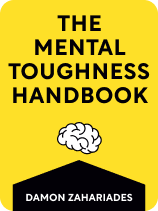

This article is an excerpt from the Shortform book guide to "The Mental Toughness Handbook" by Damon Zahariades. Shortform has the world's best summaries and analyses of books you should be reading.
Like this article? Sign up for a free trial here.
Which key mental habits offer the biggest benefits? What daily habit can make you more confident?
Damon Zahariades is a productivity expert and author of The Mental Toughness Handbook, which teaches you habits to improve your life, willpower, motivation, and inspiration. According to him, there are three key mental habits you should develop to improve your life.
Read on to discover the three daily habits Zahariades suggests to improve your life.
What 3 Habits Will Improve Your Life?
According to Damon Zahariades’s The Mental Toughness Handbook, developing habits bolsters mental toughness by giving you a consistent, stable practice to turn to in difficult times. Further, developing habits to improve your life isn’t just a thing you do, it’s a reflection of your values and priorities, says Zahariades. For example, if you run every day, you likely care about your health and, maybe, the time and mental space that running gives you to think and clear your head. Because habits are rooted in things you care about, they serve as an anchor in a way that willpower, motivation, and inspiration—which can come and go—do not.
(Shortform note: In High Performance Habits, Brendon Burchard says that high performers consistently engage in six common habits that support their other goals. Two key habits are: (1) improving your health, which builds energy, focus, and contentment, and requires that you regularly eat healthy foods, work out, and get enough sleep; and (2) developing a network of people who support you by being generous and helping others in order to earn their trust and respect.)
Zahariades recommends that you practice building several mental habits to increase your mental toughness. However, of his recommendations, the three daily habits to improve your life the most and build mental strength include self-restraint, focusing exclusively on situations you can impact or control (and ignoring those you can’t), and committing to embracing change. In this article, we’ll discuss each of these in detail.
#1: Practice Self-Restraint
The first habit to improve your life that Zahariades recommends is learning how to practice self-restraint. He says that learning to resist your immediate impulses—whether that’s eating a piece of cake or telling someone you went on one date with that you love them—teaches you to tolerate discomfort. Training your mind to live without the thing you crave at any given moment improves your cognitive resilience and ability to ignore distractions, bolstering your mental toughness.
(Shortform note: Researchers say that people with high levels of self-control are typically described as having a strong ability to resist temptation. But current research suggests they’re actually better described as being able to avoid temptation. In a study, researchers found that participants with high levels of self-control opted to work in distraction-free environments over more appealing settings with more distractions. Further, people with high self-control reported resisting impulses less frequently than those with low self-control precisely because, researchers theorize, they avoid temptations entirely rather than leaning on their self-control to resist them.)
To do this: Make a plan for how you’ll resist your impulses when they arise. This could include finding a substitute for the thing you desperately want—preferably something healthy—to ward off the worst of your temptations. For example, if you’re craving cherry Pop-Tarts, grab a bowl of actual cherries. Further, reward yourself for resisting your impulses. When you positively reinforce yourself for doing the hard work of not caving to your craving, you’ll be more inclined to continue doing it.
(Shotform note: Psychologists offer other suggestions for dealing with temptation. If you can’t avoid it entirely, do your best to work around the situation. For example, if you’re trying not to eat sweets and are at an event with a tempting dessert table, stay as far away from that table as possible. If that’s hard to do, find a way to distract yourself: Find someone to talk to or take a walk to the bathroom. Finally, think about ways to make the thing that tempts you less appealing: When you look at the plate of cookies, picture someone presenting you with a tray holding a five-pound bag of sugar on it and telling you that you have to eat the entire bag at once.)
#2: Focus Only on Situations You Can Impact
To improve your life and mental strength, Zahariades says it’s a waste of time and energy to focus on things beyond your control, so it’s important to develop a habit of recognizing what you can and can’t change and focus only on the former. This frees your mind to focus your attention where it’s most valuable.
To do this: Pay attention to the amount of time you spend thinking about things you can’t control, and refocus your energies on things you can impact. For example, instead of wasting time wondering if your boss will think the report you’re working on is good enough, focus on making it as good as it can be.
(Shortform note: Another reason to focus only on things within your control is that when you focus on too many things your brain goes into information overload, which can negatively impact your memory. When you push the brain’s working memory beyond its capacity, your cognitive functioning and efficiency deteriorate—and when you continually overload the circuits you harm both short- and long-term memory functions. To avoid overload, neuropsychologists recommend two things: First, filter out information you don’t need by taking a break from technology, so you’re not perpetually bombarded with it. Second, prioritize the flow of information you receive by turning off your push notifications.)
#3: Commit to Embracing Change
When you consistently seek out and commit to change, Zahariades says you normalize the process of stepping outside your comfort zone and into the unknown. To improve your life, he recommends developing the habit of welcoming this practice as an opportunity to take control of your life rather than waiting passively for change to happen. This builds and reinforces your confidence and ability to do it more often.
To do this: Set small, achievable goals to increase your chances of success and the feeling of reward you experience when you accomplish them. This will encourage you to continue setting and achieving new goals.
For example, if you’re not a naturally neat person but want your house to feel less cluttered, don’t set a goal of cleaning your entire house all at once, which could overwhelm you and stop you from starting. Instead, start with a small goal each day, like making your bed when you get up or washing dishes right after you use them. You’ll see immediate progress in your neatness and have less physical and mental clutter around your home, which will allow you to relax in your home.
(Shortform note: In Switch, Chip and Dan Heath say the earliest stages of change are the most challenging because even after you’ve made a change, you still have to give it time to sink in. Even though this can be uncomfortable—because new behaviors don’t feel normal or familiar—there’s good reason to stick it out: The more you do the new thing, the more you’ll get used to and appreciate it, experiencing the “mere exposure effect.” In addition, when you repeat behaviors enough, you begin to associate your identity with them, making it easier to do them. For example, if you bake every day, you’ll start to see yourself as a baker, which will encourage you to continue baking.)

———End of Preview———
Like what you just read? Read the rest of the world's best book summary and analysis of Damon Zahariades's "The Mental Toughness Handbook" at Shortform.
Here's what you'll find in our full The Mental Toughness Handbook summary:
- A step-by-step guide to building mental fortitude and resilience
- How to reframe failures and setbacks as opportunities
- How to develop long-lasting habits to increase your mental toughness






